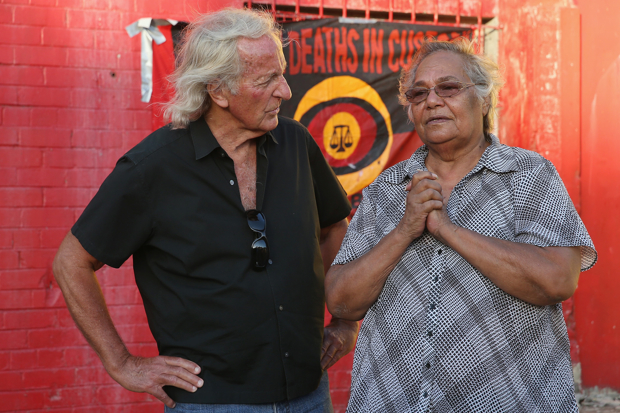A footnote to the Dolce Affair in which the literary-political magazine Overland has banned the work of the songwriter and poet Joe Dolce because of his guilty association with Quadrant. Some years ago Overland published a splendid article by the late Christopher Koch. He called it ‘The New Heresy Hunters’. It described the growing power of literary apparatchiks of ‘totalitarian outlook’ who see literature only as ‘a tool for messages’ to be delivered by ‘talentless time-servers’ while real writers are ‘driven into silence or bullied into distorting their vision.’ Even if no entrenched political position can be detected in a poet’s work, Koch wrote, ‘they will subject him to other tests — based on who his friends and associates are, and where he publishes, perhaps even on his private conversations.’ But that was 1986. Back then Overland was edited by Stephen Murray-Smith.
‘What a stupid question! What a stupid question! What a puerile question!’ This is how Warren Snowdon, the Labor MP for Lingiari in the Northern Territory, responded to John Pilger as recorded in the film Utopia — a pilgerising documentary telling what the English playwright Harold Pinter called ‘the filthy truth’ about Australian treatment of Aborigines. Pilger put it to Snowdon that he has been the representative in the federal Parliament of ‘some of the poorest, sickest people in Australia’ since 1987: ‘Why haven’t you fixed it?’ It’s hard not to feel some sympathy for the spluttering Snowdon. Pilger pinches a nerve. For generations Australians have been determined to ‘fix it’. We have tried almost everything. Missions. Welfare. Self-determination. Land Rights. Royal Commissions. Constitutional Amendments. Reconciliation Walks. The Intervention. The Apology. Billions of dollars. Nothing has ‘fixed it’ — if by ‘fixing’ we mean the elimination of poverty, squalor, disease, malnutrition, drug addiction, unemployment and violence against women in Aboriginal camps. They continue to shame Australia and shock the world. Long ago the full integration of traditional Aborigines into a modern Australia proved unworkable. Timeless Aboriginal traditions gradually or rapidly disappeared, and only remnants have survived in the demoralised outstations on which Pilger concentrates.
Yet Pilger and negativist films like his Utopia are among the greatest obstructions to Aboriginal advancement. They alienate ordinary Australians whose continuing goodwill is necessary for all our programmes of reform. In style and argument the leftist Pilger reminds me of no one so much as P.R. (‘Inky’) Stephensen, editor of the prewar neo-fascist Publicist, who in the sesquicentenary year 1938 published his contemptuous Brief Survey of Australian History deriding what he deemed the patriotic complacency of Australian yobs and snobs. In 1938 he also published the newsletter Abo Call, which campaigned for the renaming of Australia Day. He called it Day of Mourning — denouncing the arrival of the infamous British settlers of 1788. The idea has had currency ever since. Pilger is cast in the same revolutionary-defeatist mould. In an Australia Day street scene in the film he asks a passer-by if Aborigines might be offended by Aussie celebrations. The man replies ‘You are full of shit’ and moves on. Pilger uses the incident to illustrate ingrained Australian prejudice. But if it illustrates anything, it is the popular rejection of terrible simplifiers like Pilger. In Abo Call Stephensen promoted Xavier Herbert’s Capricornia as a novel supporting Aborigines against white Australians. He would have been delighted to promote Pilger’s Utopia.
Does Pilger have any proposals to ‘fix it’? He shows no interest in the ideas of Noel Pearson or Marcia Langton, or in Bess Price and the other indigenous MPs in the Northern Territory. He seems unaware of any government programmes or of the work of countless private organisations ranging from conservative Rotary Clubs to the libertarian Centre for Independent Studies. He does not mention the continuous commitment of Tony Abbott. At the end of the film, he calls for a Treaty between Australians and Aborigines. But a Treaty (or series of Treaties as Warren Mundine recommends) would have as little influence as The Apology. It would probably make matters worse by bolstering separatism.
The best policy remains assimilation, not separatism. As it happens this is the underlying theme of an important new play — Tom Wright’s Black Diggers. A sort of rejoinder to Pilger’s Utopia, it is about the thousand or so indigenous soldiers who joined the AIF in the first world war and fought alongside fellow Australians in Palestine, the Somme, Gallipoli and Flanders Fields. The play’s director Wesley Enoch says that they ‘forged bonds that would sow the seeds of the modern reconciliation movement’. The play’s researcher David Williams observes that the black recruits were fully integrated into the AIF (unlike in many foreign armies.) He quotes Gary Oakley of the Australian War Memorial: ‘The Army was Australia’s first equal opportunity employer.’ They received the same pay and same training as other soldiers and experienced the same hardships. Any negative stereotypes quickly disappeared in the trenches. Their service obviously did not eliminate prejudice in the postwar years, but it was a giant step in the right direction. Assimilation — and a play like Black Diggers which received standing ovations at the Sydney Opera House — do far more to advance the Aboriginal cause than the anti-Australian and ultimately anti-Aboriginal propagandists from P.R. Stephensen to John Pilger.
Got something to add? Join the discussion and comment below.
Get 10 issues for just $10
Subscribe to The Spectator Australia today for the next 10 magazine issues, plus full online access, for just $10.
You might disagree with half of it, but you’ll enjoy reading all of it. Try your first month for free, then just $2 a week for the remainder of your first year.














Comments
Don't miss out
Join the conversation with other Spectator Australia readers. Subscribe to leave a comment.
SUBSCRIBEAlready a subscriber? Log in